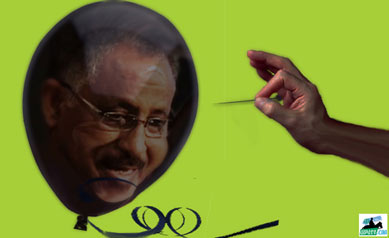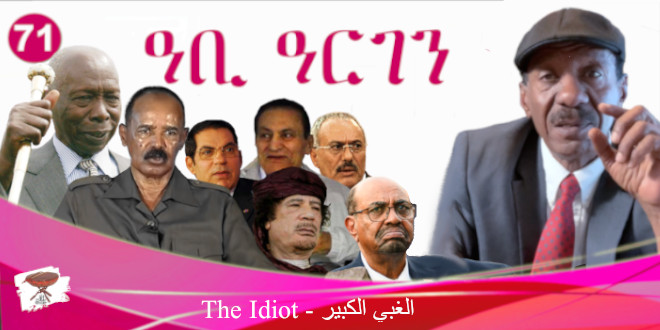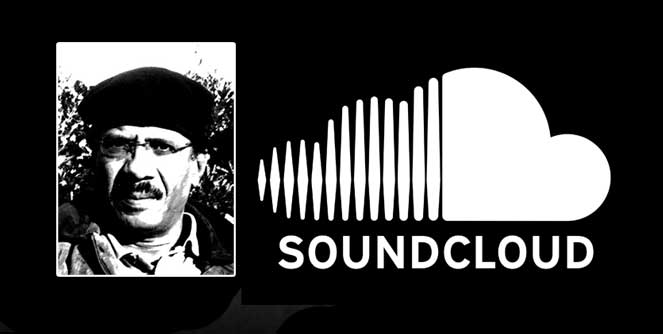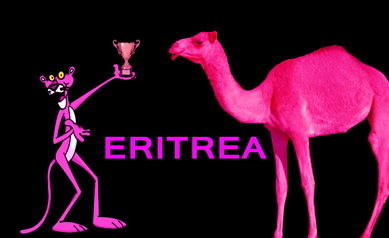UHURU: An Eritrean Cry From Nairobi

This edition of Negrit comes in two sections. The first is about the journey that culminated in the convening of the Nairobi meeting; the second is a postscript. I believe many are expecting my personal reaction to the “Veto” exercised against my attendance by Andeberhan at the final session of the Nairobi meeting. Indeed they might expect an explanation, but for me, an activist and a writer who fails to defend himself cannot defend the cause of a nation; but I realize my ego should not be placed above the interest of the nation. That is why I will address the purpose and outcome of the meeting first and relegate my personal story on the second section as a postscript because that is what it amounts to, a postscript.
Lately I came to realize that all the sectarian, regional, and other divisions are manifestations of the debilitating partisan divisions of the struggle era that some are cunningly keeping alive. The partisan culture had damaged Eritrean traditional cultural values and forcefully imposed itself in its place. Unfortunately, the entire nation didn’t resist the onslaught on our culture save for some meek objection to the colorless, tasteless and confused struggle-era culture. Not surprisingly, we were so much committed to the cause of independence of Eritrea that we allowed the excesses of the armed organizations; we are still suffering from the damage 25 years after the independence of our country. Unfortunately, the otherwise relentless and heroic struggle has produced an authoritarian rule, a militarized culture, a self depreciating dis-empowered citizen, and an apathetic culture.
As we usher Eritrea towards a normal, civil, and peaceful existence, we should address our experiences honestly to resolve our contradictions. But first, we have to realize that the armed struggle is our collective legacy and experience which ended in 1991. Thereafter, we are bogged down in a struggle against an authoritarian rule that has to be removed. Anything we do should be measured by how much closer it gets us to our goal. But meetings and seminars, however we try to present them, are useless unless they produce tangible results. We need to move on to normality where every Eritrean is seen as a citizen before being seen in the many other identities. It’s in this aspect, and in this light, that I see the significance of the Nairobi meeting.
As my readers know, I have been skeptical about Medrekh since the day it was launched. Disappointed by all the events of the past, I had developed an aversion to the feel-good projects that are carried out to be forgotten in a week or two. It seems many have lost self-confidence that they seem to expect salvation in the goodwill of foreigners who (with the exception of a few) consider our cause just a file to revamp their portfolios and develop their resumes as experts on Eritrea for their personal career advancement. We are not a portfolio, but a nation whose struggle may be statistics for the career oriented, though it is a noble struggle to us.
Five months ago I came to know that Medrekh was working on a project to bring all opposition entities together for discussion with a goal of creating an atmosphere of cooperation and tangible unity. I started consultations with the task-force that was working on the project, and though I was still skeptical, I decided to help out, simply because the idea of reconciliation is central to my struggle. We started with a relatively divergent ideas, but we got closer and closer by the day thanks to my strong friendship with both Asefaw (the leader of Medrekh) and Semere Habtemariam (the task coordinator).
Semere is simply a close friend of mine whom I would trust with my family. I have known Dr. Asefaw since the days of G13, to which I was invited but couldn’t join. I had just arrived in the USA as a stateless person: My Ethiopian passport was revoked (because I was part of the Eritrean referendum committee) and I was denied an Eritrean passport (because I criticized the government before and during the Badme War). However, I participated with my ideas which were presented on my behalf by my friend Dawit Mesfin. Since then, my relation with Asefaw went through ups and downs, but it always remained cordial, even in the face of severe disagreements. So much so that if I were to be banished to Ella-Ero and was asked to choose a company, Asefaw would be my choice. Over the years, the gap between us has been narrowing; on the Nairobi project, it was almost identical. I worked hard to make the goals of the project be realized and contributed my share, and constantly contacted Medrekh, particularly my friend Semere who did the bulk of the job. I am proud of my engagement in the project and I will do the same forever, even after the demise of the dictator. So, obviously I had a stake in the success of the Nairobi meeting.
On the other side of the isle, the original opposition forces are my erstwhile allies. In spite of the ups and downs of our relations, our fate remained intermingled and I never saw myself outside the camp that contains them. I am also proud to say that I have maintained strong relations with almost all the organizations, helping, consulting, and advancing our common causes. Bringing the opposition forces together has always been my dream—and I thought I realized a big dream that we coined “4+1” when my other friends, Adhanom Gebremariam and Abdella Adem joined the Salvation Front and the others. That experience was too bold for its time and unfortunately didn’t work out as I hoped. But Adhanom and Mohammed Nur Ahmed carried it out in a smaller scale and EPM is at the forefront of such a dream.
Admittedly, I never liked the Reform idea and always expressed my views against it. However, it seems neither the reform minded nor those who opposed the idea explained themselves clearly and the issue remains vague to this date.
The extreme version of the reform idea is to remove Isaias and a handful of others hoping the sun will continue rising from the East and set in the West. I tend to think, in that scenario, the sun will never, never, move—it will remain overhead and burn everything under it.
The anti reform camp is also another extreme, its proponents think everything in Eritrea belongs to the PFDJ and Isaias, thus, everything should be destroyed. That is not a call for peace and stability, but chaos and mayhem. You don’t save something in order to destroy it!
For instance, I believe the defense forces are assets of Eritrea, they don’t belong to any party of the groups but the entire population. However, it’s severely disoriented nature needs to be corrected in order to orient its loyalty towards the Eritrean people, preferably though a just and democratic constitution. Eritrean wealth that was confiscated by the PFDJ and the resources that it forcefully accumulated, belong to Eritreans and as such they should be turned over to the government of Eritrea. In short, any governmental institution belongs to the people—of course, a serious rehabilitation and cleansing program will be needed to rid the institutions of the PFDJ induced culture of nepotism, partisanship, and corruption. But why would anyone destroy his own national institutions?
In short, the corrupt criminal PFDJ entity needs to be eradicated as a party, and as was indicated in many instances, those who are wreaking havoc in Eritrea and are responsible for our predicament are estimated to be not more than “several hundreds men”. As such, our message to the public, both internal and external, should be designed with the above in mind.
It’s with that conviction that I committed myself to work for the success of the Nairobi meeting and these are the ideas I believe in. But to reach to a concrete agreement on the above, and create a united Eritrean opposition leadership to pursue it, is not an easy undertaking. However, I think the Nairobi meeting has made it a lot easier and charted the next steps to reach the goal.
Generally we tend to demolish what we invested in and focus on building new structures on which we embark to demolish in no time. When the EDA aspired to build a more robust and inclusive umbrella it called for the creation of the ENCDC which is by far the most inclusive and widely accepted political arrangement so far. I believe it can be expanded to accommodate the EPDP and Medrekh who I believe understand what is at stake at his moment. I also believe the ENCDC is magnanimous and flexible enough to make such an undertaking a success—the Nairobi meeting has paved the way for such an undertaking. If we are skeptical about such an undertaking, all we need to do is, reflect on the last five years since the Hawassa convention and see how we have squandered our time and resources, and opportunities that presented themselves to us—due to both internally and externally induced crisis. That, I am sure will help us endorse such an idea.
Forgetting the small hiccup, the Nairobi meeting was excellent and opened the way for further cooperation among the opposition forces—I wish the public will subdue its perceptions, egos, negativity and skepticism, and for a change, rally behind such an objective. I will do just that and I hope I will not have to write anything bad about it—provided it is blessed with honesty, humility, be goal oriented and not a show-off and arrogance. Moving ahead, there are programs that need to be executed and we have to do our parts.
In Nairobi, all the negative perceptions were cleared, seeing how Dr Asefaw and Hussein Khelifa appreciated each other is just an example, an indication. The rest of the interaction were equally uplifting and they are too much to list here.
Lastly, I wish my friend Adhanom could have attended, but he couldn’t due to passport expiry date and visa complications, he could have contributed immensely to the discussions. But his spirit was there. Also, I really enjoyed my time with patriotic Eritreans, including Mohammed Nur Ahmed, Mesfin Hagos, the intellectual powerhouse Herui Bairu, Bashir Ishaaq, AbulAbbas, Negash Osman, Jemal Saeed, Woldeyesus Ammar, Mohammed Sefer, Muhyeddin Shengeb, Mengisteab Asmerom, Asgedet Mihreteab, Tewelde Gebreselasse, Dr. Almaz Zerai, Khedija Mohammed Ali, the Patron of Artists–Hussein Mohammed Ali, Suleman Hussein, Saba Fessehaye, Beyan Negash, Samuel Akka, Dr. Awet Woldemichael, Mohammed Burhan Blatta, and Dr Adane Teckle. I also had the opportunity to meet members of the Eritrean community, including Dr Asia Abdulkadir, Colonel Hussein, Ahmed and others whose names I can’t recall.
Postscript
On Sunday morning, Andeberhan Woldegiorgis put his colleague in a precarious situation when he threatened to expel me from the meeting unless they take me out of the meeting hall silently. They had tried to dissuade him from that bullish decision for hours to no avail and they were afraid a conflict will ensue and derail the meeting if they rejected his decision, or if he tried to expel me from the meeting. Looking so distressed, and embarrassed, they called me out for a word and explained to me the problem. At first I asked them to tell Andeberhan that I challenge him to expel me in front of the attendants to see if the they will approve of his decision or defy it in solidarity with me. I openly stated, “we will see how many people will sell me out and how many will turn against him.” The atmosphere was scary and there was a risk the meeting would end in chaos. My conscience didn’t allow me to be part in the failure of the meeting and I decided to subdue my feeling for the sake of the meeting instead of reciprocating with similar foolishness and bullish behavior that Andeberhan displayed. His ego and stubbornness was despicable, standing against four of his colleagues–he might have felt proud that he held the meeting hostage, but on the contrary, he proved his mettle and what kind of team spirit he has: none.
At any rate, I decided not to tell anyone about what happened until the end of the meeting; I didn’t want the attendants to continue the meeting in a tense state. After dinner and celebration in the city, back at the hotel, we all met and that is when Dr. Assefaw gracefully apologized to me for what happened, and acknowledged my role in the meeting and thanked me. I rejected his apology because Medrekh doesn’t owe me one, and I have not seen anything but respect and camaraderie from him and his colleagues. But I fail to understand Andeberhan’s mortifying motive. At any rate, he attempted to politically liquidate me, and since he called for it, I will give him a clean fight. Hussein Kehlifa, Herui Bairu, Woldeyesus Ammar and several others commented on the issue and expressed their disappointment passionately and stated their solidarity with me and they considered Andeberhan’s disrespect of me as a disrespect to all the attendants. The comments would have gone on for the rest of the night had Semere not mitigated it.
I also concluded, unless he reforms himself, Andeberhan cannot have a positive contribution in any project related to unity or organizing the opposition. His behavior, considering the negative luggage that he carries, is surprising to say the least. And though his blunders are made of enticing juices, particularly for a writer and satirist, I promise not to be enticed.
Lastly, if there is anyone wondering, yes, I didn’t just arrive in Nairobi, I was invited and was provided with air tickets and hosting by Medrekh. And yes, I stayed in Addis Ababa for a few days, met several people, and I attended a few personal and public affairs–I will soon write about my personal observations in a much lighter tone.
Unfortunately, I can’t say more on this for the time being, but let me share with you the following links which might explain Andeberhan’s spiteful motive and vengeance:
1. Reasons To Doubt Reliability of ICG’s Report (Nov. 8, 2008)
2. An article I wrote in February 10, 2014
3. The Frankfurt workshop: Last May an Eritrean residing in Germany met Andeberhan and suggested the usual “let’s get all the opposition parties meet.” Andeberhan encouraged the man to go ahead. Equipped with that endorsement, the man approached Dr. Gunther Shroeder, who in turn took the opportunity and convinced his friend Dr. Hartmut Quehl of Felsberger Institute to host the meeting—if you are wondering, though I cannot present an evidence, the attendants’ list was suggested by Andeberhan and the selected entities were invited to Frankfurt. Of course, some NGOs think Andeberhan is the new cowboy who will ride the opposition camp horse and then take Isaias’ seat to ride the rest of Eritreans. Faced with such dilemma, our women exclaim, “Wooo lille!”
I also suspect an email I sent to Dr. Hartmut Quehl somehow reached Andeberhan who was instrumental in the holding of the Frankfurt workshop, and he might have increased his grudge one notch. Here is the message I sent to Dr. Hartmut:
****
November 2, 2015
Dear sirs,
First, on behalf of myself and the Awate Team, allow me to thank you for your interest in Eritrean issues and your willingness to help. We wish you luck in your endeavor.
I would also like to mention that we believe your team is capable of pulling this together, and please note that in the past, we had limited communication with Dr. [Gunther] Shroeder; his presence in your team assures us that your planned event must have been well thought of and we hope it will be productive.
Having said that, let me state that we expected to see a public announcement about the event–if not a media circular to us or a general press release. Unfortunately, nothing of that happened.
As you might be aware, for the last fifteen years awate-com has been following all Eritrean related activities diligently, and as such, since last September we have started to collect bits of information regarding your planned event. For our dismay, judging from what we have seen so far, it feels like we know “the end of the movie.” We believe it might turn out to be chaotic if you are lucky, or if you are not, it will be ignored as if it didn’t happen, just like the many such events of the past.
There are a few concerns that we hope you will consider:
- For the most part, Eritreans are suspicious of any NGO initiated activity because they seem to focus on theory at the expense of real practical issues.
- Generally, the choice of the list of invited attendants doesn’t represent all stakeholders, but those who have contacts with the NGO world and are considered good enough representatives.
- NGO initiated events seem to be poorly thought of and the preliminary research on the matter seems to be haphazard, thus cooking its own failure and negative perception.
- They lack proper in advance planning in crisis management and warding off negative media and perception as an outcome—these seem to overshadow any positive outcome.
- The events give the impression that they are hastily prepared and lack support of the overwhelming majority of stakeholders.
- Also, such events unknowingly foster further crisis and divisions among Eritrean forces.
Here, allow me to share with you a negative response as a sample: a few days ago a senior opposition figure was asked if he was attending the Frankfurt meeting. He replied, “Foreigners cannot invite me to do my job on my behalf.”
Such is the political paranoia and mistrust that has been festering for too long among Eritreans.
The above are some of the points of concern and I would like to propose the following:
- Cancel the date and extend it to a later date—most NGOs seem to be concerned by the use-it-or-lose-it spending limitations and rush to hold half-baked events before the December 31st budget year, I hope you do not have such concerns.
- Set a criteria for attendants—are you after individuals who can make political decisions, or intellectuals who can discuss concepts and ideas, or just presence?
- Make sure to invite from the cross section of the Eritrean groups, identify who they are and how you want them represented.
- If it is an intellectual (academic) meeting, then invite academicians and describe the goal of the event clearly.
Finally, please don’t hesitate to contact me if you wish, and I wish you luck.
Saleh Johar
****
In conclusion, though I don’t understand why the above would infuriate anyone, I am just presenting what I think might have triggered Andeberhan’s vendetta, or rather what seemed like a long held grudge. Like all patriots, I was glad when he decided to join the opposition forces after he abandoned the authoritarian regime against which I tirelessly fought for the last two decades, and to which he belonged until recently. Again, Andeberhan is welcome to the opposition camp, which is the domain of every noble Eritrean. However, when the opposition welcomes him, it is as a citizen and not as a privileged person who should boss people around—bossing people requires merit, particularly in social skills, character, and a humble demeanor.




Awate Forum